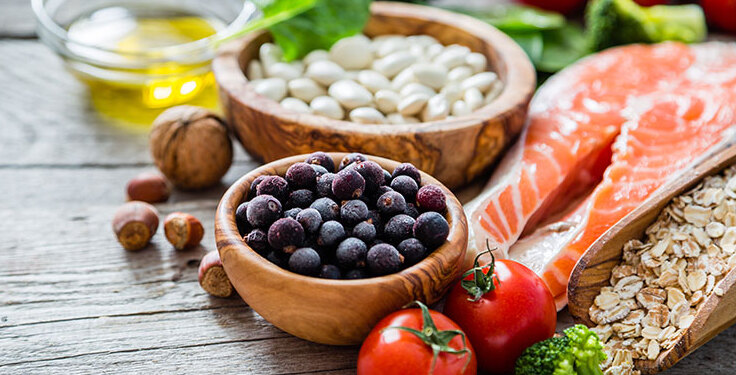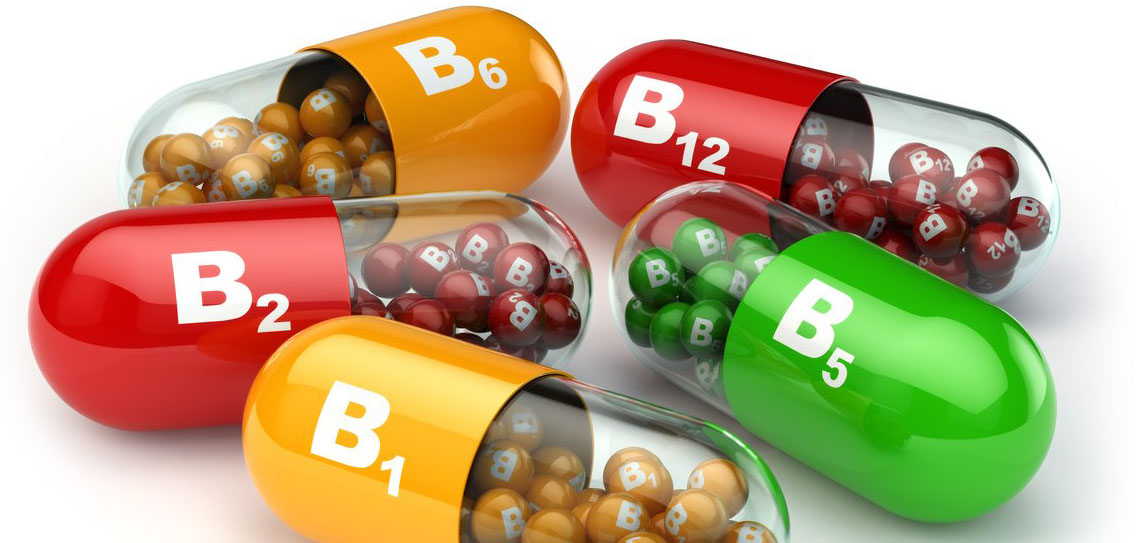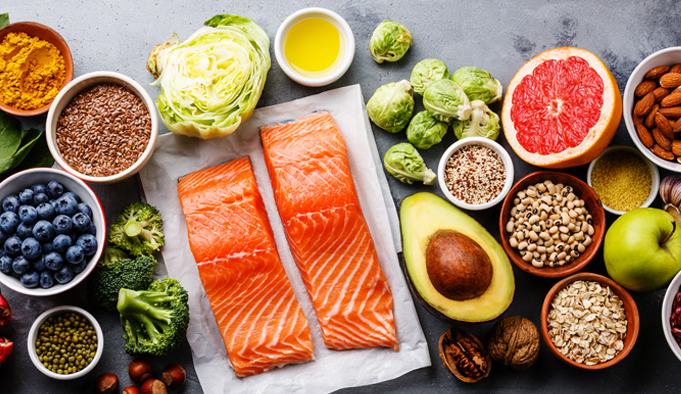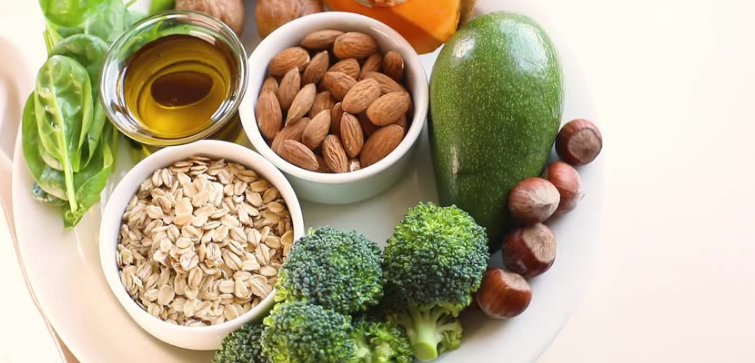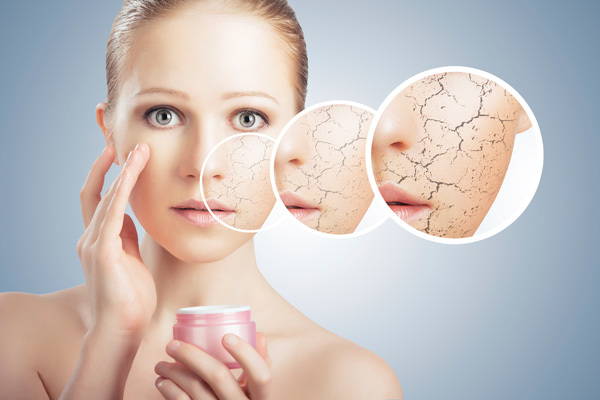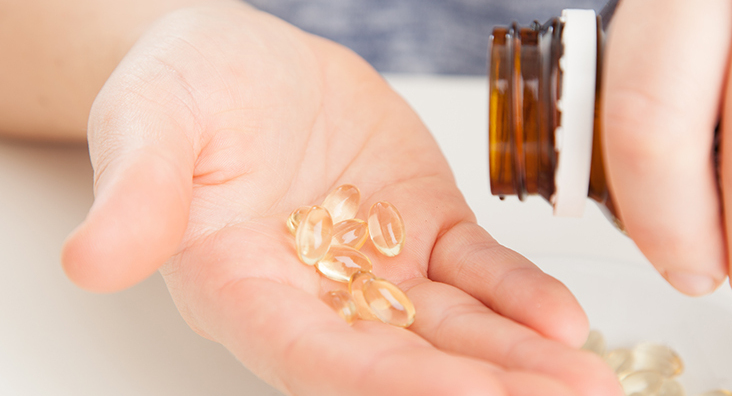Vitamin E is part of a group of fat-soluble vitamins that work as an antioxidant (1, 2), improving many functions throughout the body.
Adequate levels of vitamin E protect the body from free radical damage (3). Free radicals build up in the body over time from many environmental factors and lifestyle choices such as smoking and exposure to air pollution (4, 5).
It is typically rare for anyone to be low or deficient in vitamin E because it stores in the body (6), and there are some foods high in this crucial vitamin. There are other foods fortified in it as well.
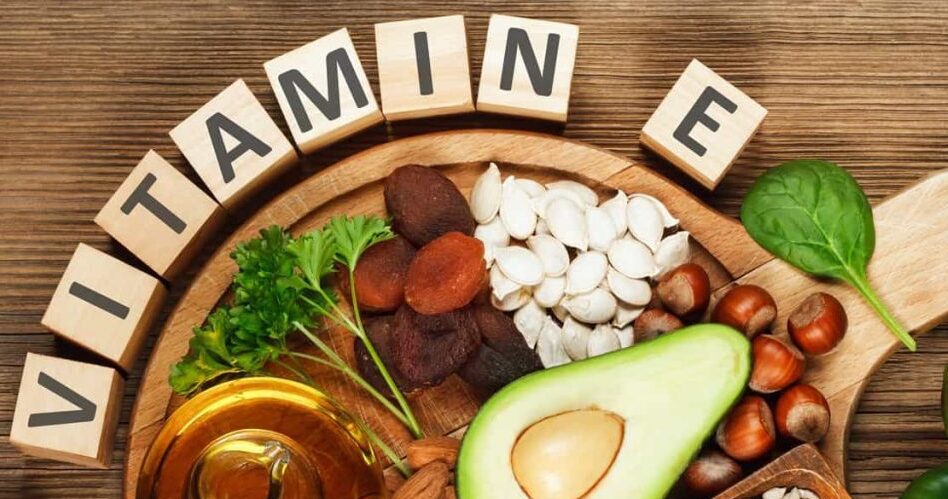


However, it is possible to be deficient in Vitamin E if you have malabsorption or maldigestion issues (7). Vitamin E requires fat to digest and absorb into the cells, so if you cannot digest fats, you can have a hard time getting enough vitamin E (8).
One factor that can cause a deficiency in intestinal permeability, which does not allow you to absorb vital nutrients (9, 10). Having a healthy gut lining and microbiome is essential to attain the nutrition you need (11).
Vitamin E has powerful antioxidant properties, and there are two forms of it called tocopherols and tocotrienols (12, 13). The body breaks down eight compounds from tocopherols (14). Blood levels of vitamin E depend on your ability to absorb it through the liver and small intestines (15).
Summary: Vitamin E is a fat-soluble vitamin that has high antioxidant properties. Factors that affect vitamin E absorption include malabsorption or maldigestion issues, and fat intake. It requires fat to digest and absorb into the body. If you have a hard time digesting fats, it may cause issues with vitamin E absorption.
Table of Contents
Health Benefits of Vitamin E
Check out the information below to see the many health benefits of vitamin E. Learn the best dietary sources and potential risk factors of taking too much, as well.
1. It May Prevent Cancer
Many nutrients are necessary to help prevent against cancer and stay healthy, like vitamin A, vitamin C, zinc, vitamin D, and vitamin E (16, 17, 18).
Vitamin E works as a potent anti-inflammatory agent and antioxidant that helps to fight free radical build up in the body (19).
Cancer can occur when the body has too many free radicals, which can create oxidative stress and damage throughout the cells (20, 21). Several animal and human studies show it can have protective effects against cancer (22). However, more research is necessary to prove this.
Most people get enough vitamin E from food alone (23), while others may benefit from a small dose supplement or even a dose in their daily multivitamin.
Summary: Many vitamins and minerals, such as vitamins A, C, D, E, and zinc, help protect against cancer. They help to fight free radicals in the body. If there are too many free radicals, oxidative stress and damage can occur which can lead to cancer.
2. It Can Improve Vision
Many vitamins and nutrients are necessary to maintain and improve vision beyond vitamin E, including zinc, vitamin A, copper, lutein, and more (24, 25).
Vitamin E may play a significant role in vision health because of its powerful antioxidant properties (26).
Less oxidative stress in the body due to less free radical build-up leaves more space for healing throughout the body (27).
Vitamin E and other nutrients are necessary to maintain vision health, help prevent cataracts and macular degeneration in older adults, and more (28).
Summary: Vitamin E is one of the many nutrients needed to maintain and improve vision. Zinc, vitamin A, copper, and lutein are other nutrients that can help with vision. Vitamin E’s powerful antioxidant properties fight off oxidative stress, which helps to maintain good vision, and prevent cataracts and macular degeneration.
3. It Can Improve Heart Health
Heart disease is a common disease in the United States. It is the number one contributor of death, affecting nearly 800,000 Americans every year (29).
While more research is necessary to support vitamin E for the prevention of heart disease, there is some research that it can promote better heart health (30, 31).
The heart requires antioxidant power to prevent oxidative stress from causing downstream issues like heart attacks, stroke, and hypertension (32). Make sure to feed your body with plenty of nutrients from food and any additional support you may need through supplementation.
Antioxidant supplementation proves to help enhance heart repair after cardiac damage (33). Other antioxidant vitamins include folate, vitamin C, selenium, coenzyme Q10, and beta carotene (34, 35).
Heart issues and heart health are complex, and many lifestyle factors are involved. Dietary consumption is a critical piece of the puzzle in healing heart issues as well.
Summary: Consuming vitamin E rich foods can help prevent against heart disease. The heart needs antioxidants to prevent oxidative stress, which can lead to heart attacks, stroke, and hypertension. Other antioxidants that help with preventing heart disease include folate, vitamin C, selenium, coenzyme Q10, and beta carotene.
4. It May Boost Brain Power
Vitamin E can even help to improve cognitive health, leaving a potentially less chance of developing memory problems, and more (36, 37).
Many epidemiological studies show that those who have higher blood levels of vitamin E have less frequency of cognitive decline, including Alzheimer’s disease (38).
Alzheimer’s disease does have a genetic connection, but there is a variety of research that shows you can prevent its occurrence with diet and lifestyle changes (39, 40). Epigenetics, the study of humans’ ability to change their gene expression with environmental factors, is another strong component to consider when preventing many chronic diseases (41).
A healthy brain is another complex topic. To improve brain health, you must eat a healthy balanced diet, exercise frequently, and continue learning new things. Give your brain a bit of a boost with these activities and adding some brain-boosting foods high in vitamin E today.
Summary: Vitamin E is an important nutrient that can help prevent cognitive decline, memory issues, and even Alzheimer’s disease. Eating a balanced diet with plenty of vitamin E-rich foods, exercising, and learning new skills all contribute to boosting brain health.
5. It May Relieve Inflammatory Skin Issues
Inflammation in the skin can range from a variety of conditions, including eczema, wounds, bruising, skin cancer, psoriasis, acne, scarring, and much more.
There is some evidence that vitamin E, especially topically, can have protective effects on the skin (42). That is why you often see vitamin E in overnight skin creams, serums, moisturizers, and other cosmetic products.
Vitamin E in dermatology can have significant effects because of its antioxidant and photoprotective properties (43, 44).
However, more research is necessary to prove this claim. The most important things you can do to keep your skin healthy, moisturized, and scar-free is to eat nutrient-dense foods regularly, get more movement, sleep well, and minimize processed foods. Healing often begins in the gut.
Summary: Vitamin E can help improve inflammatory skin issues, including eczema, wounds, bruising, skin cancer, psoriasis, acne, and scarring. Vitamin E has even shown to improve skin health when used in topical solutions. Its high antioxidant and photoprotective properties make it a great skin health booster.
6. It May Slow Down the Aging Process
Because vitamin E is a powerful antioxidant, some research suggests it can help slow down the aging process as well (45, 46).
That may be because vitamin E is a strong combatant of free radicals in the body (47). Vitamin E is also in many anti-aging serums and products for that reason. However, many of these creams and lotions have little concentrations of vitamin E, so be careful not to fall for the hype.
The skin is the largest organ in the body, and it needs enough nutrients from a variety of sources to stay healthy and supple.
Other nutrients to promote healthy skin include vitamin A, plant flavonoids, zinc, polyphenols, and much more (48).
No research promoting one vitamin proves to be 100 percent effective at combatting aging skin. However, eating a balanced diet full of antioxidant-rich fruits and vegetables is the number one proven way to keep your skin looking younger, longer.
Summary: Vitamin E is a powerful antioxidant that can delay the aging process. Many anti-aging serums and products contain vitamin E. Eating a balanced diet full of antioxidant-rich foods is one of the best ways to keep skin looking younger.
7. It May Prevent Sunburn
Sunburn plagues many people, but could there be a supplement to minimize and even prevent the pain? There may be.
Some studies show that the combination of vitamin E and vitamin C can have a significant benefit at preventing and healing sunburn and erythema (skin redness caused by increased blood flow) (49).
That fact may also prove that the combination of the powerful vitamin E and C can help protect against photoaging and skin cancer (50). Both vitamins have powerful anti-inflammatory properties due to their high antioxidant levels (51).
If you get sunburn even with sunscreen, it can be helpful to make sure you are getting sufficient vitamin C and E before going outside. These two vitamins can never replace sunscreen, but when combined, they can help prevent sunburn and relieve pain after.
Summary: The combination of vitamin E and C has been shown to help prevent against and heal sunburns. The anti-inflammatory properties and high antioxidant profile of both vitamins is the reason behind its powerful skin healing. However, it should not replace the use of sunscreen.
Foods that Have Vitamin E
Some foods contain high levels of vitamin E. Foods that are high in vitamin E are easy to come by if you know what they are. Humans do not need a ton of vitamin E to meet their daily requirements, so it can be easy to get your fill.
Wheat germ is a top source of vitamin E (52), packing in about 20 mg per serving, or 135 percent of the daily recommended intake. Wheat germ, along with many of the nuts and seeds below are an easy and healthier way to get the vitamin E you need.
Foods like corn and sunflower oil should be left aside for the majority of your diet. They tend to be hidden in many foods already, to it is not something you need to eat all the time.
You can get your vitamin E from foods like the ones listed below:
- Wheat germ
- Corn, sunflower, and safflower oil
- Sunflower seeds
- Almonds
- Hazelnuts
- Peanut Butter
- Spinach
- Broccoli
- Mango
- Kiwi
- Tomato
- Fortified cereal and other foods
As you can see, there are not a ton of foods that are high in vitamin E, so it is crucial to add some of these foods to your diet at least occasionally.
Think about your typical daily diet for a minute. Do you get at least some of these foods in your often?
Add them to smoothies, oatmeal, or make them as a side dish with your favorite lean protein for a healthy meal. See where you can start adding more vegetables, fruits, nuts, and seeds rich in vitamin-E to your regular diet
Summary: Some of the highest sources of vitamin E can be found in wheat germ, sunflower seeds, almonds, hazelnuts, peanut butter, spinach, broccoli, mango, kiwi, tomato, fortified cereals, and corn, sunflower, or safflower oils. Try a vegetable omelet with spinach and broccoli, fruit smoothie with mango and kiwi, or snack on almonds, sunflower seeds, and hazelnuts daily.
Potential Health Risks of Vitamin E Toxicity
Vitamin E is a fat-soluble vitamin that works as an antioxidant in the body. It is critical to banish free radicals, so they cannot create oxidative damage in the tissues and cells (53).
However, since vitamin E is fat-soluble, it is easy to get too much from supplements (54). It is less rare to get too much from food alone, although if you eat excessive amounts, it can happen. Even excessive amounts of broccoli can do more harm than good. Balance is the key to optimal health.
Vitamin E toxicity can happen when you take regular high doses of the supplement regularly. If you think you may be taking too much vitamin E, and you experience any of the below symptoms, be sure to cut back on your dosage or eliminate it.
Some potential health risks that can occur from too much vitamin E include (55, 56):
- Blood-thinning
- Excessive bleeding after injury
- Stroke
- Potential higher risk of death
Keep in mind that there are also some drug interaction safety risks to be aware of if you are taking vitamin E supplements. These include blood thinners like aspirin and warfarin, drugs to treat breast cancer, and much more.
Not sure if you are taking too much vitamin E? Be sure to speak with your doctor if you experience any of the above symptoms or if you are taking any drugs you think may interact with your dosage.
Summary: Vitamin E is a fat-soluble vitamin. Many fat-soluble vitamins can be harmful when eaten in excess. Taking high dose supplements of vitamin E may put you at risk toxicity which can cause blood thinning, excessive bleeding after injury, stroke, or potential higher risk of death. Blood thinners such as aspirin and warfarin may interact with vitamin E as well. Talk to your doctor or pharmacist about drugs that can interact with vitamin E.
Conclusion
Vitamin E has multiple compounds that act as antioxidants in the body. They are crucial to carrying out functions in the body, mostly eliminating free radicals from causing oxidative damage to major organs.
Taking vitamin E supplements is not necessary for everyone, although some may benefit from potential hair, skin, and immune-boosting benefits.
If you make sure to get vitamin E from your regular diet, you will be in good shape. Try not to worry about extra supplements if you can eat them instead.
Always seek out a healthcare professional if you are unsure how to get started with a healthy diet and lifestyle. They can help you get on track fast and seamlessly.






